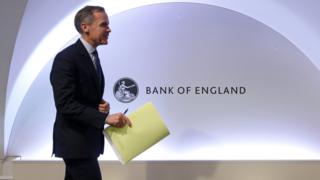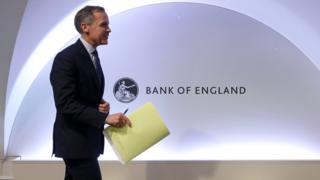Bank of England: Who will be the next governor?
The runners and riders tipped to replace Mark Carney as governor of the UK’s central bank? …

 Image copyright Getty Images
Image copyright Getty Images The interviews are over. The shortlist is complete. But with so much political uncertainty, the appointment of the next governor of the Bank of England is anything but predictable.
The search for the UK’s most important unelected post started in April. Interviews took place this summer, and an announcement was scheduled for the autumn.
Diversity was highlighted as a priority for the UK Treasury, which plays a key role in the appointment. It appointed a headhunting firm that specialises in placing women in top roles.
But it’s been a turbulent summer that has resulted in a new government and chancellor. A general election would increase the likelihood that an announcement is postponed.
Current governor Mark Carney’s term officially ends on 31 January.
The man or woman who replaces him will chair three key committees that set interest rates, monitor financial stability and regulate the financial sector.
Here are some of the people who have been linked to the role.
Andrew Bailey
Andrew Bailey joined the Bank of England in 1985. He has served a number of roles at the Bank, working his way up from its international financial markets division to chief cashier, where his signature featured on billions of UK banknotes.
He also served as a deputy governor and head of the Bank’s prudential regulation division, before joining the Financial Conduct Authority as its chief executive in 2016.
The city watchdog has come under fire recently for failing to question fund manager Neil Woodford’s investment in risky stocks before his flagship fund was forced to suspend trading.
Mr Bailey has also been criticised over the collapse of savings firm London Capital & Finance, which went bust at the start of the year after taking £236m from more than 11,500 customers.
Shriti Vadera
Lady Vadera was born in Uganda and moved to the UK as a teenager.
She spent over a decade at Swiss investment bank UBS before joining the UK Treasury’s council of economic advisers in 1999.
She later served as a minister in the Labour government of Gordon Brown and became a trusted adviser to the former chancellor and prime minister.
She also helped oversee the plan to rescue the UK financial system in 2008. That earned her a fierce reputation within government.
Alistair Darling, the former chancellor, tried to bar her from Treasury meetings during the financial crisis amid growing tensions at Downing Street.
Writing in his memoirs, Mr Darling said: “Like many investment bankers I have met, she appears to believe that unless there is blood on the carpet, preferably that of her own colleagues, then she has not done her job.”
Lady Vadera currently serves as chairman of Santander UK. The bank has reportedly drafted plans to replace her if she becomes the next governor.
Ben Broadbent
The former Goldman Sachs economist has also held roles at the Treasury and worked as an economics professor at Columbia University, in New York.
He joined the Bank as an interest rate setter in 2011 and became its deputy governor for monetary policy in 2014.
Mr Broadbent was in the headlines last year for describing Britain’s economy as going through a “menopausal” phase, which he said described economies that were “past their peak and no longer potent”.
Mr Broadbent said in a speech in May that many businesses were holding back investment because of the uncertainty around Brexit.
While he has been involved in the Bank’s transparency drive, Mr Broadbent is against publishing a regular forecast of the likely future path for interest rates.
Jon Cunliffe
Sir Jon joined the Bank in 2013 after spending 18 months in Brussels as the UK’s permanent representative to the European Union.
Before that, he served as an adviser to the prime minister on European and global issues and also helped to manage Britain’s role in the first Greek bailout.
While Sir Jon’s role as deputy governor for financial stability is his first job at the Bank, between 2002 and 2007, he regularly sat in on Monetary Policy Committee meetings as the Treasury’s representative.
Sir Jon is an English literature graduate and spent his early career as a lecturer in Canada.
Ahead of the 2016 Brexit vote, he led a secret taskforce, dubbed Project Bookend, at the Bank of England examining the possible financial fallout of leaving the EU.
Minouche Shafik
At the age of 36, Nemat “Minouche” Shafik became become the youngest ever vice president of the World Bank, where she was responsible for $50bn (£30bn) of investments.
Dame Minouche has also had prominent roles at the Department for International Development and the International Monetary Fund.
She joined the Bank of England as deputy governor for markets and banking in 2014.
While her departure after just two years in the role raised eyebrows, Dame Minouche insisted she was cutting short her five year term to pursue her “dream job” as director of the London School of Economics (LSE).
Other names in the frame
Legal & General chairman Sir John Kingman has been linked to the role. However, he has said he did not apply and is not interested in the job.
Politics could also play a part in the appointment. Brexiteer Gerard Lyons, a former economic adviser to Boris Johnson during his time as Mayor of London, has been interviewed for the governor job. Helena Morrissey, another Brexiteer, was also reportedly interviewed.
Past applicants could also feature. Sir Howard Davies, chairman of RBS, who lost out to Mr Carney last time. He is a former Bank deputy governor, has chaired the Financial Services Authority and been director of the LSE.
Exception to the rule?
There could also be late applicants. Mr Carney was allowed to submit a late application ahead of his appointment in 2012.
Mr Carney, who was governor of the Bank of Canada at the time, sent his application more than three weeks after the original October cut-off date had passed.
He met former UK chancellor George Osborne on a Sunday to interview for the job, and was announced as the next Bank of England governor a week later.
Mr Carney has extended this term twice, and did not rule out staying in the post beyond 31 January should Brexit be delayed.
Earlier this month, Mr Carney said he was staying on to “facilitate a smooth transition” in terms of getting the financial system ready for Brexit, and handing over to his successor. He told the Treasury Select Committee: “The first is in place, and the second remains to be filled.”
A Treasury spokesman said an appointment would be made “in due course”.



